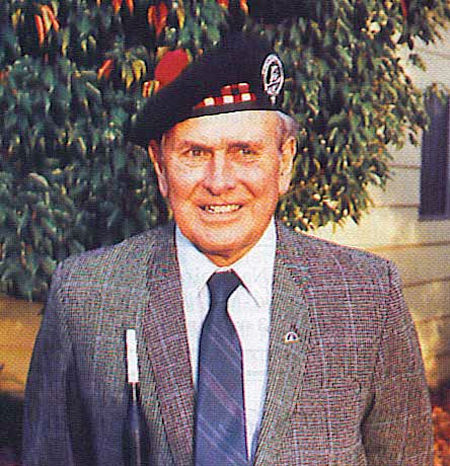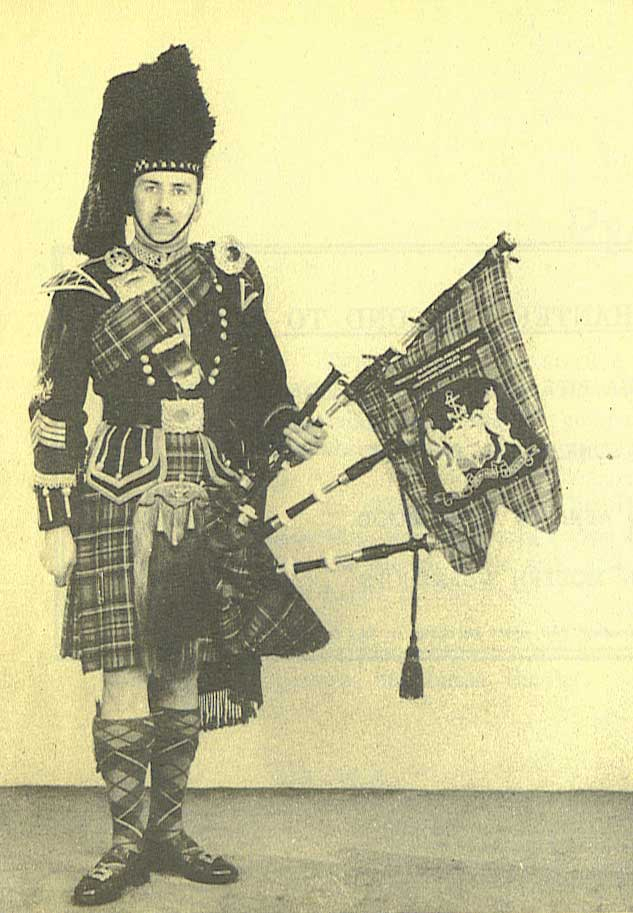|
The Highland
Light Infantry later the Highland Light
Infantry (City of Glasgow Regiment) was
a regiment of the British Army. It was
formed as part of Childers reforms on 1
July 1881 by the amalgamation of the
71st (Highland) Light Infantry and the
74th (Highlanders) Regiment of Foot,
becoming the city regiment of Glasgow
its name being expanded to reflect this
in 1923. Its exact status was a somewhat
ambiguous one - although the regiment
insisted on being classified as a
non-kilted Highland regiment, it
recruited mainly from Glasgow in Lowland
Scotland.
The HLI (as it
was always known) continued in service,
actively taking part in the First and
Second World Wars, until it was
amalgamated with the Royal Scots
Fusiliers in 1959 to form the Royal
Highland Fusiliers (Princess Margaret's
Own Glasgow and Ayrshire Regiment).
The
HLI was the only Highland regiment to
wear trews, until 1947 when kilts were
authorized. An earlier exception was the
Glasgow Highlanders who wore kilts and
were a territorial battalion within the
HLI.
 |
Donald
Shaw Ramsay was born in 1919 in
Torphichen, Scotland. When he
was eight, his first teacher was
Sandy Forrest, who was then
Pipe-Major of the Torphichen &
Bathgate Pipe Band, which exists
today, led by Pipe-Major Gordon
Stafford and promoted to Grade 1
in October 2008.
Ramsay
enjoyed early success in solo
competition, doing well in the
junior categories at, among
other events, the Northern
Meeting. At 19, he became
pipe-major of another local
band, and the next year joined
the 10th Battalion Highland
Light Infantry, recruited by the
colonel of the battalion to
establish a band who pulled
strings to ensure that Ramsay
was part of his group. At the
time, however, the minimum age
for a British Army pipe-major
was 21, but corners were cut and
Ramsay became the latest
"youngest pipe-major ever," a
title that seems to have been
given to numerous people over
the years. It was with the 10th
HLI during the Second World War
that Ramsay saw action, and
wrote one of his first great
compositions, the 6/8 march,
"The 10th Battalion H.L.I.
Crossing the Rhine." |
Immediately
after the war, Ramsay became piper to
the Duke of Hamilton. He joined the
Edinburgh City Police force in 1947 and
was again recruited, this time to take
over the Edinburgh City Police Pipe
Band. He officially succeeded Duncan
Cameron on October 7, 1949. The band at
the time was considered something of an
also-ran; the dominant Glasgow Police
and Shotts and Dykehead Caledonia
garnering most of the prizes. Ramsay set
about tossing revamping the band for
competition success, recruiting new
players and dismissing many stalwart
members.
Success was
virtually immediate. The Edinburgh
Police won the World Pipe Band
Championship in 1950 and then again in
1954. The band hadn't won a major since
1919.
With the
Edinburgh City Police Ramsay began to
extend the reaches of pipe band music,
which, until then, had comprised only
large MSRs and parade marches. In what
would seem today as content for
lower-grade bands, his introduction of
two-parted strathspeys and reels,
dot/cut hornpipes and jigs set the pipe
band world on its head. With the band's
expanded repertoire, borrowing heavily
from accordion and fiddle sources, it
became in-demand for performances, and
the superstar era of the Edinburgh
Police that would last until the
late-1970s was started.
Ramsays's own
composing ability also took off. He
collaborated with Highland wear and
bagpipe-maker Hugh MacPherson to publish
two volumes of the Edcath Collection,
which showcased his tunes and brought
much of the band's repertoire to the
masses. The collections, which also
include several snare scores by Jimmy
Catherwood and Alex Duthart, are
considered today as classics, on the
same level as those from Willie Ross and
Donald MacLeod.
His
compositions are relatively few, but his
rate of hitting the melody and
popularity bull's-eye might be
unparalleled: "Mrs. Lily Christie," "Schiehallion,"
"Angus MacKinnon," "Tam Bainís Lum,"
"Jimmy Young" "Mary Horne" and "Flora,
Mrs. MacLeod of MacLeod" are all
essentials in any good piper's
repertoire.
Ramsay's
career continued apace until 1957 when
he was shot at point-blank range in the
abdomen while investigating a call while
on duty with the police. After more than
six months of recovery, he returned to
duty only to be injured again in another
crime investigation. He was forced to
retire with full pension and moved to
San Francisco, eventually working with
the Wells Fargo Bank, only to leave the
job to start a Highland outfitting
business, The Scotch House. He also took
over the San Francisco Caledonian Pipe
Band, bringing them to "Grade 1" in
1960.
In 1964
another dark event struck Ramsay when
his shop was robbed, his wife held at
gunpoint. That same year he was
recruited once again, this time by the
Invergordon Distillery in the north of
Scotland, whose chairman, Frank Thomson,
was determined to create a world-class
pipe band as a marketing mechanism.
Ramsay accepted, moved back to Scotland
and again set about creating a
competitively dominating pipe band from
virtually nothing.
 |
Over the
next four years Donald Shaw
Ramsay convinced the likes of
John D. Burgess, John
MacDougall, Alex Duthart, Kit
Reynolds, Jim Hutton and Bert
Barr to join the Invergordon
ranks, put on the distillery's
payroll. Again, with an
innovative spirit similar to the
one Ramsay deployed with the
Edinburgh City Police,
Invergordon combined competition
success with musical adventure.
The band's LP on 1966 featured a
full rendition of the
piobaireachd, "The Old Woman's
Lullaby," complete with
multi-level harmonies and
non-traditional percussion. The
band would also win every major
championship except the World's.
After
the Invergordon "experiment"
ended, Ramsay returned to the
United States, and was yet again
recruited, this time to start a
new pipe band program at the St.
Thomas Episcopal School in
Houston, Texas. He agreed, but
found the climate unbearable,
and he negotiated quarterly
visits instead. Among the
students was Mike Cusack, who
Ramsay taught and who would
eventually become the United
States' most decorated solo
competition piper ever.
Ramsay's next 25 years were
relatively quiet, in piping
terms. He continued to teach and
work with pipers in the San
Francisco area, and was an
occasional judge at events. He
returned again to Scotland to be
closer to his daughter, and he
and his wife ran a guest house
in the Highlands for more than
10 years. While he had
accreditation on the RSPBA's
adjudicators' panel, he
infrequently judged in Scotland.
His last significant judging
assignment was on the Grade 1
circle at the RSPBA's Diamond
Jubilee competition in 1990. |
Donald Shaw
Ramsay died on July 14, 1998. He was
buried at Grand Sable Cemetery in
Polmont, Scotland, and former-Lothian &
Borders Police Pipe-Major Harry McNulty
played "Schiehallion" at the funeral.
|



